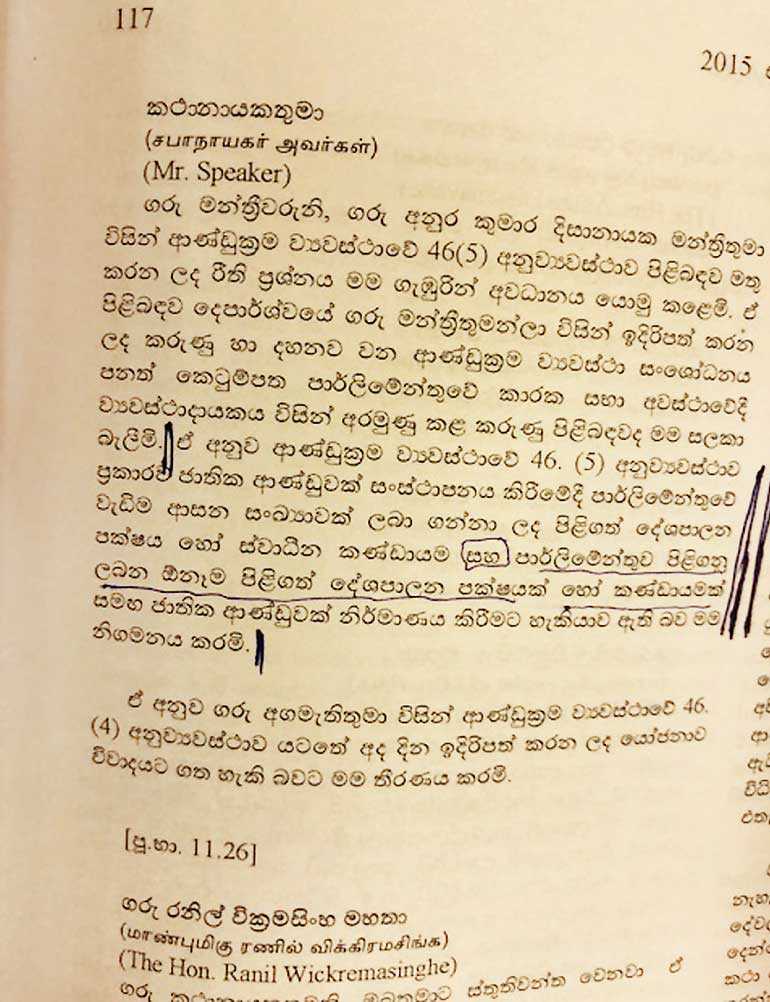Wednesday Feb 25, 2026
Wednesday Feb 25, 2026
Wednesday, 18 April 2018 00:03 - - {{hitsCtrl.values.hits}}

The so-called National Unity Government formed on 3 September 2015 through a motion by the Prime Minister (Hansard, column 97, 3 September 2015) can now be construed as unconstitutional, especially with the outcome of the No-Confidence Motion and the resignations tendered by the SLFP Ministers
The President, by extraordinary gazette, has prorogued Parliament with effect from 13 April and the next sessions will be on 8 May. It was earlier reported in the media that President Sirisena has accepted the resignation letters tendered by 15 SLFP ministers, including six Cabinet members, and the Deputy Speaker, who voted for the No-Confidence Motion against Prime Minister Ranil Wickremesinghe. Cabinet Spokesman Rajitha Senaratne said that a new Cabinet would be sworn in after the New Year holidays.
Background: Going against the mandate
During the last Parliamentary election campaign in 2015, the UPFA has categorically stated that they would not join with any party to form a National Government. Their manifesto was also silent on supporting a National Government. Therefore, there was no mandate given by the people for the UPFA elected members to support the move to form a National Government.
Quote: “…The members of Parliament hold a mandate and are agents of the people.” These are the extracts of the judgement delivered in 1987 on the 13th Amendment to the Constitution by Justice Wanasundera. However, a section of the UPFA elected members (including those who come through the National List) from the constituent party of SLFP has agreed to join the National Government.
National Government in terms of Article 46(4):
The process of forming the National Government was undertaken with a decision enforced on the Central Committee of the SLFP by the Chairman, who happened to be the President of Sri Lanka. A MOU between the two parties, namely the UNP and SLFP, has been entered into in August 2015. The SLFP is not a recognised political party in Parliament and as a result the SLFP joined the National Government as a separate group, and not as a recognised political party in terms of Article 46(4) of the 19th Amendment.
The National Government has so far enabled the elected MPs and even defeated candidates to carve out portfolios and privileges in Parliament, thus wasting valuable taxpayers’ money. The innocent citizens continue to pay direct and indirect taxes to the general Treasury to maintain a large Cabinet of Ministers and Non-Cabinet and Deputy Ministers.
Going against the rule of law
Consequent to the Local Government elections, Sri Lanka’s ruling alliance (UPF) was humiliated at the local elections and the SLPP under former President Mahinda Rajapaksa (SLPP) pulled off a stunning victory. However, there is no mandate given to SLPP/JO to take part in the Government. It is also true that Parliament cannot be dissolved till March 2020, unless two-thirds of the members decide themselves to dissolve the Parliament.
The present Government continues to function as a National Government formed between the UNP and SLFP headed by the Executive President, whereas the Prime Minister of the said National Government represents the UNP which obtained the highest number of seats at the last general elections.
My view is the National Government in terms of Article 46(4) cannot function only with a section of the SLFP members, as six Cabinet Ministers representing the SLFP have now decided to be in the Opposition.
Excessive number of ministers positively harmful to running of Govt.
The so-called National Unity Government formed on 3 September 2015 through a motion by the Prime Minister (Hansard, column 97, 3 September 2015) can now be construed as unconstitutional, especially with the outcome of the No-Confidence Motion and the resignations tendered by the SLFP Ministers.
Maybe a new Leader of the Opposition could be appointed within a member of the JO. Under the circumstances, it is unethical and bad in law to maintain the number of Cabinet Ministers beyond the stipulated maximum of 30 under the 19th Amendment. Evidence-based empirical studies show that an excessive number of ministers is not only unnecessary, but also positively harmful to the running of Government.
Conclusion
What needs to be done by the people is to push for a reduction of the Cabinet to its original number of 30 on the basis that the National Government has lapsed. It is important to reduce unnecessary and wasteful Government expenditure without burdening poor people by increasing taxes.
Therefore, it is expedient that the Members of Parliament would discuss this matter in Parliament when they resume on 8 May in order to move away from the present National Government and form a new government and work with a ‘30 member’ Cabinet as per the Constitution.
The writer could be reached via email at [email protected]